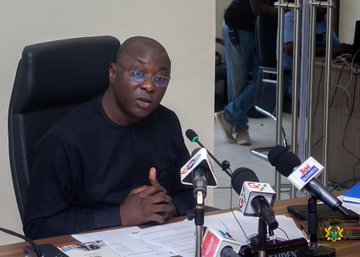Dr. Mohammed Amin Adam, the Minister of Finance, has assured the public that Ghana’s macroeconomic environment remains stable, with promising signs of economic recovery emerging. This assertion follows the implementation of the International Monetary Fund (IMF)-supported Post COVID-19 Programme for Economic Growth (PC-PEG) by the government.
Speaking at the inaugural Monthly Economic Update Series at the Ministry of Finance in Accra, Dr. Adam highlighted several positive indicators indicating economic resilience and robustness. These include declining inflation, stabilized exchange rates, improved Gross International Reserves (GIR) position, and a decreasing rate of public debt accumulation following a debt restructuring exercise.



According to Dr. Adam, recent economic performance reflects the cooperation and sacrifice of all Ghanaians, emphasizing the government’s appreciation for their support during challenging times.
“This economic performance we are witnessing has been achieved through the cooperation and sacrifice of all Ghanaians, and I take this opportunity to express the government’s appreciation for the immense support,” the Finance Minister stated.
Ghana’s economy faced significant challenges in recent years, including high inflation, currency instability, high interest rates, slow economic growth, and unsustainable public debt levels. These challenges prompted the government to seek assistance from the IMF, leading to the approval of Ghana’s programme in May last year.
Ten months into implementing the programme, macroeconomic stability appears to be re-emerging. Preliminary data from the Ghana Statistical Service (GSS) indicates a provisional GDP growth of 2.9% in 2023, surpassing the target set in the 2023 Mid-Year Review Budget. Inflation has also declined significantly, while the depreciation of the cedi against the US dollar has moderated.
Additionally, the current account and trade balances have improved, with the country recording surpluses in both areas. Gross International Reserves (GIR) have also shown improvement, providing greater stability in the external sector.
On the monetary side, the Bank of Ghana (BoG) has adjusted the policy rate downwards, leading to a decline in interest rates. Fiscal indicators also point towards positive trends, with the debt-to-GDP ratio reducing to 71.4% at the end of 2023.
Looking ahead, Dr. Adam emphasized the government’s commitment to sustaining the gains made under the IMF programme, despite 2024 being an election year. He outlined a growth strategy with a focus on developing small and medium enterprises (SMEs) to support economic expansion in the medium term.
Addressing challenges such as access to finance, markets, and tax constraints for SMEs, the government aims to create a conducive environment for sustainable growth driven by SMEs.
“Government is determined to address, particularly, the financing challenges which have become very critical in SME development.
“This will ensure that we generate growth internally from SMEs underpinned by a robust SME financing ecosystem that can be leveraged as a vehicle for sustainable growth,” the Finance Minister stated.


































